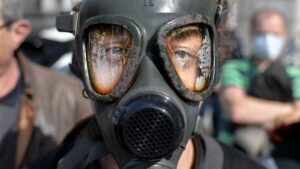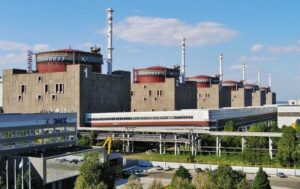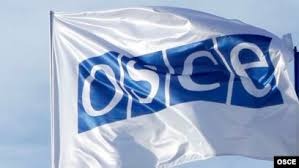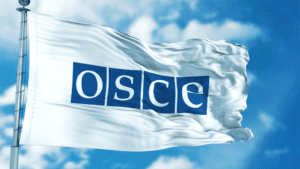
The OSCE Project Co-ordinator in Ukraine has published a collection of leaflets and publications on chemical security risks to help civilians take care of their safety in the conditions of ongoing hostilities.
“Military campaigns in such an industrialized country as Ukraine bear serious risks of incidents with the release of toxic chemicals, endangering people and the environment. Interruptions in work of enterprises, targeted or accidental hits of industrial facilities in the course of combat or as a result of air and rocket strikes – these factors increase chemical security risks immensely,” said Ambassador Henrik Villadsen, the OSCE Project Co-ordinator in Ukraine.
An assessment produced by Ukrainian State Emergency Service in 2018, mentioned that 655 facilities across the country stored more than 216,000 tons of dangerous chemicals. Research on the environmental impact of hostilities in Donbas, performed with the support of the OSCE Project Co-ordinator, highlighted severe chemical security concerns, as more than 500 major interruptions of work for enterprises in the eastern part of Ukraine were recorded between 2014 and 2017.
The awareness-raising materials include a leaflet, “Chemical Incidents. Leaflet on Risks and Safety Measures” that provides generalized guidance on safety measures related to accidents with toxic substances. Four other leaflets contain specific guidance for occasions of release or spills of most widespread chemicals – ammonia, mercury, chlorine and nitric acid. They also contain practical advice on administering medical assistance in such cases. In addition, the Co-ordinator is organizing a webinar for journalists to help them better understand the risks in this context.
The collection also contains publications, created specifically for the training of emergency response personnel, which will also be the basis for further production of awareness-raising materials and as a useful source of information for local authorities and other civilian services in planning measures in response to possible emergencies.
These materials, updated according to the recent developments, were developed by the OSCE Project Co-ordinator with the financial support of the European Union, United States of America, and Germany as one of the project’s activities aimed at enhancing chemical safety and security in Ukraine.
This newsitem is published here

Ukraine insists that a special monitoring mission of the Organization for Security and Cooperation in Europe (OSCE) should establish round-the-clock control and analysis of the situation at all domestic nuclear facilities, in particular, Chornobyl and Zaporizhia, as well as other Ukrainian operating nuclear power plants.
As reported on the website of the Ministry of Energy of Ukraine on Sunday, this is stated in a joint appeal of Energy Minister Herman Haluschenko and heads of the State Nuclear Regulatory Inspectorate Oleh Korikov and the state-owned enterprise Energoatom Petro Kotin dated March 5, sent to OSCE Secretary General Helga Maria Schmid.
According to Haluschenko, the letter contains detailed information about the criminal and threatening actions of the Russian army near and at the nuclear facilities of Ukraine themselves. This refers primarily to the seizure of Chornobyl and Zaporizhia nuclear power plants and, at the same time, the terror of personnel and residents near the cities.
The authors of the appeal called on the OSCE to immediately begin work to establish and document all the facts of the crimes of the Russian troops that threaten the safe operation of nuclear facilities and could lead to an environmental catastrophe on a global scale, the report says.

OSCE Chairperson-in-Office, Swedish Minister for Foreign Affairs Ann Linde will pay a working visit to Ukraine on June 13 to June 15.
“This will be the second visit of Ann Linde to our country from the beginning of the Swedish chairmanship in the OSCE, which confirms Sweden’s priority attention to the issue of ending the Russian Federation’s armed aggression against Ukraine,” the press service of the Ukrainian Foreign Ministry said.
The key subjects of the talks between Ukrainian Foreign Minister Dmytro Kuleba and Ann Linde will be the security situation in temporarily occupied territories of Ukraine, efforts for a political and diplomatic settlement of the Russian-Ukrainian armed conflict, the activities of the OSCE Special Monitoring Mission in Ukraine, and freedom of navigation in the Azov and Black Seas.
The ministers will also discuss the development of the political dialogue between Ukraine and Sweden, the increase in trade and investment, the strengthening of interaction in international organizations, the intensification of cooperation in the cultural and humanitarian sectors.
The OSCE Chairperson-in-Office will visit, along with the Ukrainian MFA leadership, the area of the Joint Force Operation, where she will personally get acquainted with the activities of the OSCE SMM in Ukraine and the consequences of the Russian armed aggression, the peculiarities of the movement of ships in the Black and Azov Seas.
On June 15, Kuleba and Linde will hold a joint press conference.

OSCE Secretary General Helga Maria Schmid will visit Ukraine this week for meeting with high-level Ukrainian officials and travel to Donbas, the OSCE press service said.
“Schmid plans to hold talks with senior-level officials, including Deputy Prime Minister and Minister for Reintegration of the Temporarily Occupied Territories of Ukraine Oleksiy Reznikov, Foreign Minister Dmytro Kuleba, and Dmytro Razumkov, Chairman of the Ukrainian Parliament. The talks will focus on the crisis in and around Ukraine and on ways to strengthen co-operation between the OSCE and Ukraine,” the OSCE press service said in a statement released by on Tuesday.
During his visit, the Secretary General will also meet with the staff of the OSCE Special Monitoring Mission to Ukraine (SMM) and the OSCE Project Coordinator in Ukraine.
She will also meet with representatives of international humanitarian organizations, as well as civil society representatives and youth activists. Schmid also plans to visit eastern Ukraine to see first-hand the situation in conflict-affected areas and the work being carried out by SMM and Project Coordinator in Ukraine on the ground.

The conflict in Donbas is not and cannot turn into a frozen one, OSCE Chairperson-in-Office, Swedish Foreign Minister Ann Linde has said.
“I am categorically opposed to calling the conflict in Donbas or Crimea frozen […] As this will mean that you have surrendered and do not consider it possible to resolve it. And I believe that Donbas is definitely not frozen now. After all, the Trilateral Contact Group or the Normandy format is still in operation, trying to find a solution,” Linde said in an interview with Yevropeiska Pravda (European Truth) published on Wednesday.
She said that at the Normandy Four summit in Paris, there was an agreement on a new meeting of leaders under a number of conditions.
“Ukraine has fulfilled all the conditions. Russia, unfortunately, has not yet. Now everything depends on how the negotiations will continue, on how it will be agreed to fulfill these conditions,” Linde said.
According to her, there is still a positive result from the negotiations, this is a truce that has been going on since July 27. “And even despite the fact that now we see a worsening of the situation, that a Ukrainian serviceman died a week ago, the situation is still much better than it was a year ago. After all, in 2020, there were 34 victims in January and February alone,” the OSCE Chairperson said.
Linde said the priority of her chairmanship is to try to resolve the conflict, or at least take a step towards its solution, without departing from the principle of comprehensive security.
“And, we will, of course, continue to follow the principle of the integrity and unity of Ukraine, which includes the Ukrainian Crimea and Sevastopol. We will try to build on the achievements of the preliminary chairmanships in the OSCE, using both the Normandy format and the Trilateral Contact Group,” she said.
When asked whether the OSCE should become a participant in the Normandy format, Linde said it is not, since Normandy is already an established format. She said that it is always worth analyzing what is effective, what works. And the current Normandy format is just working.
“But the OSCE has concentrated its efforts in the Trilateral Contact Group, where our representative Heidi Grau does a very important job. And even if she is criticized in Ukraine, in fact she does a lot to get closer to resolving the conflict, and these efforts deserve support as well as the work of the SMM – the greatest mission of our organization,” she said.

The crisis in Ukraine and around Ukraine is the key problem of security on the European continent, OSCE Chairperson-in-Office and Slovakia’s Foreign Minister Miroslav Lajčák said in an interview for the Faces of Peace project.
“The number of casualties we have seen in eastern Ukraine in the past five years is higher than anything we have seen elsewhere in Europe this century,” he said.
Lajčák said the OSCE’s Special Monitoring Mission (SMM), which is made up of more than 1,300 members, has done extremely important work since it was deployed in Ukraine during the spring of 2014.
“Our monitors are in the field observing and reporting on ceasefire violations, monitoring the latest developments and the hardship faced by people,” he said.
Lajčák evaluated the current situation in eastern Ukraine, noting that the ceasefire agreement starting on July 21, 2019, was a positive development leading to a significant decrease in the number of casualties among the civilian population and ceasefire violations.
“Nevertheless, unfortunately recently (As at October 11, 2019) there were days when there were more ceasefire violations than before recommitment,” he said.
Lajčák focused attention on the fact that “positive dynamics between Russia and Ukraine led to the exchange of prisoners” and noted important steps in taken under the aegis of the Trilateral Contact Group on regulating the situation in Donbas, where the sides agreed to the process of withdrawing forces and the so-called Steinmeier Formula. He also noted repair work done to help people crossing the bridge in Stanytsia Luhanska.
Lajčák expressed the hope that there would soon be a summit of Normandy Four leaders (Ukraine, Germany, France and Russia).
“There have been very good discussions within the Normandy Format that will, I hope, lead to a long-awaited Summit of the Normandy Four leaders,” he said.
Slovakia has had the rotating chairmanship of the OSCE since January 1, 2019, when Lajčák became Chairperson-in-Office. Ukrainian Foreign Minister Vadym Prystaiko has invited him to jointly visit Stanytsia Luhanska and inspect infrastructure repairs there.